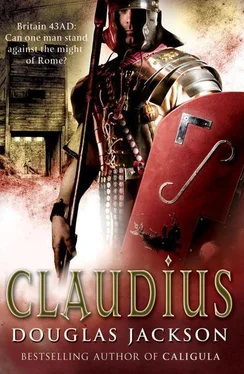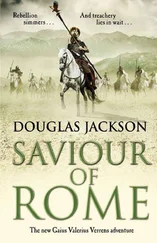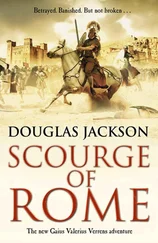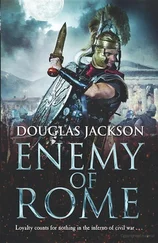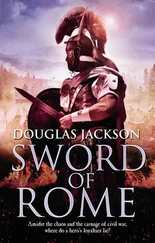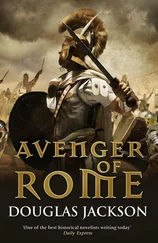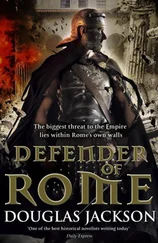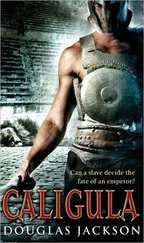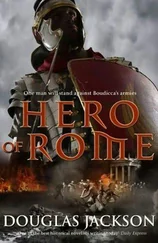Douglas Jackson - Claudius
Здесь есть возможность читать онлайн «Douglas Jackson - Claudius» весь текст электронной книги совершенно бесплатно (целиком полную версию без сокращений). В некоторых случаях можно слушать аудио, скачать через торрент в формате fb2 и присутствует краткое содержание. Жанр: Исторические приключения, на английском языке. Описание произведения, (предисловие) а так же отзывы посетителей доступны на портале библиотеки ЛибКат.
- Название:Claudius
- Автор:
- Жанр:
- Год:неизвестен
- ISBN:нет данных
- Рейтинг книги:4 / 5. Голосов: 1
-
Избранное:Добавить в избранное
- Отзывы:
-
Ваша оценка:
- 80
- 1
- 2
- 3
- 4
- 5
Claudius: краткое содержание, описание и аннотация
Предлагаем к чтению аннотацию, описание, краткое содержание или предисловие (зависит от того, что написал сам автор книги «Claudius»). Если вы не нашли необходимую информацию о книге — напишите в комментариях, мы постараемся отыскать её.
Claudius — читать онлайн бесплатно полную книгу (весь текст) целиком
Ниже представлен текст книги, разбитый по страницам. Система сохранения места последней прочитанной страницы, позволяет с удобством читать онлайн бесплатно книгу «Claudius», без необходимости каждый раз заново искать на чём Вы остановились. Поставьте закладку, и сможете в любой момент перейти на страницу, на которой закончили чтение.
Интервал:
Закладка:
Behind him, Rufus heard Narcissus say quietly: ‘Great Caesar, I give you Camulodunum.’
XXXIX
The preparations for the surrender of Britain began immediately, but it would take time to bring together the men — and the woman — who would give Claudius the total victory he had bought at so high a price. Narcissus could rightly have taken his place in the Emperor’s retinue with a dozen aides at his beck and call, but the Greek set up his tent among the staff of the Twentieth legion, where the comings and goings of his British messengers invited less comment. There were other reasons for his choice of quarters.
‘I would be safer dining with Caratacus himself than the political peacocks who have followed my master here,’ he complained when Rufus visited him that night. ‘With him, at least, I would know where the knife had come from and I could drink my wine without wondering if it had been flavoured with hemlock.’
The legions had created a great tented camp close to one of Camulodunum’s enormous ramparts and the engineers of the Twentieth were busy preparing the ground for the permanent fortress they were to build on a rise a mile to the east above the river’s bend. In many ways the British capital was a disappointment to the men who had fought so hard to reach it. They thanked their soldiers’ gods that the Emperor had at least spared them the last battle, but they had expected a mighty fortress, or a city worthy of a king and therefore worthy of their efforts, where they could reap the traditional soldiers’ rewards of women and wine. But all they found was a piece of the island much like any other. A gently rumpled blanket of greens and browns that faded away into the shimmering, hazy blue of the middle distance, the skyline above pierced by the smoke of an occasional cooking fire. The only settlement worthy of the name was on the hill beside the bend in the river where the barbarian craftsmen had their homes and workshops. Otherwise the landscape was populated by small, scattered groups of roundhouses, each accommodating a few families who lived side by side with their cattle, hogs and sheep amid well-maintained fields protected by hedges and banks and connected by paths and droveways.
Only Narcissus seemed satisfied. ‘A capital is not just a place where kings and princes dispense their rule,’ he explained. ‘It is a symbol; a symbol of power. Claudius now has that symbol in his grasp. He came here to conquer Britain. As far as Rome is concerned, Camulodunum is Britain. If he has this, he needs nothing else. Oh, he will get the rest in time: gold from the west, whatever the northern wilderness has to provide; even Caratacus. But that is the future. Camulodunum and the surrender of ten of this country’s rulers will guarantee his immortality.’
They began to straggle in over the next day. Adminius was the first to arrive, heralded by the raucous blare of a British war horn, full of his own importance and eager to ensure his service against the Dobunni was not forgotten. The principles for the gathering had been set by Narcissus, with each delegation limited to fifty in number, including advisers, priests and warriors. Rufus noticed without surprise that the king of the Cantiaci had dispensed with religious or political counsel and that the band which followed his chariot along the colour-splashed avenue of legionary standards and banners to the camp consisted entirely of his tribe’s champions, their shields freshly painted and their weapons polished silver bright.
Cogidubnus made them wait. He lingered for a day before he made his entrance, as relaxed with his new Roman name as he was with the promises he had already prised from Narcissus: the guarantee of his kingship and the subsidies and trading rights that would make him the richest man in the new province. His bodyguard numbered less than thirty, and, as Rufus watched them ride in, he saw with a shock that Verica’s murderer, Gavan, was at their head. The black-browed warrior grinned and raised a fist in mock salute as he rode past, but his compatriots were as alert as cats and their eyes never strayed far from the royal contingents who had preceded them. Including Adminius, these now numbered eight. Bodvoc was there, but the strength that had made him so formidable had been gnawed away by the parasitic doubt that breeds deep in the heart of the defeated. Rufus saw Cogidubnus staring with the hungry eyes of a winter-starved wolf and wondered how long it would be before the Regni found a new ruler.
Only one other war band drew Rufus’s attention. They trotted in an hour before Cogidubnus, every man well horsed on one of the little British ponies and with sword and spear at the ready. Something about the way they sat their ponies placed a single word in his head. Iceni. These were Ballan’s people. Their queen was stationed half a length behind her much older husband, who must be King Prasutagus, heir to dead Antedios. Rufus studied her as she rode past. She wasn’t beautiful; even if the fierce expression she wore ever softened, her features were too strong to be described as pretty. A heavy brow and a nose that might have been Roman. But striking? Yes. Her tangled mane of russet hair and the queenly way she held herself caught the eye the way a more beautiful woman never could.
Nine kings and one queen. But not the queen Narcissus had expected or wished for.
As the sun rose towards its noonday peak the Greek visited each of the British compounds in turn to present the Emperor’s compliments and pass on his instructions for the following day. Everything had been prepared. The Twentieth had constructed hut circles in the Celtic style so that the vanquished should at least have familiar surroundings as they came to terms with their new status. They had felt the power of the legions; now they would discover the benevolence of their new ruler before they were introduced to the realities he imposed. Cogidubnus would have his Roman citizenship and his subsidies, but he would still be subject to Roman taxes. Prasutagus would be free to trade the horses for which his tribe was justly famed, but his far-spread lands would be shackled by Roman roads and his every movement studied by Roman watchtowers. The minor tribes would pick the crumbs like little brown sparrows from the Emperor’s table, but they too would have a price to pay. To each of the kings, Narcissus presented a suitable gift from his Emperor — a matched set of drinking cups fashioned from gold and fixed with precious stones; a king’s ransom — and each courteously accepted it in his own way. But for two.
The first surprised him. Prasutagus of the Iceni seemed an amenable man and a pragmatist who was aware of the new reality. But when he saw the first glint of gold as the goblets were unpackaged the king frowned and the hand he reached out was quickly withdrawn as the leather curtain that split the hut behind him was pulled back. Narcissus glanced up to find two unsettling green eyes staring at him from beneath a tangled crown of red hair.
‘We will take your gold, Roman, but do not think you can buy us with it,’ Boudicca of the Iceni announced dismissively. When he left the hut the Greek realized he had learned something. He thought he had seen it in every form, but now he knew the true meaning of hatred.
The second was Adminius. The Atrebate chief’s face lit up when he recognized the quality of Claudius’s offering, but, with an effort that was blatantly obvious to an experienced dissembler like Narcissus, he quickly replaced it with a look of pained disappointment. ‘I had expected more for my services than a few pots and pans,’ the Briton sniffed. ‘Surely the man who killed Togodumnus should have Togodumnus’s lands and Togodumnus’s possessions. It is our way. Our tradition.’
During the time he had spent with Verica, Narcissus had absorbed every piece of information he could glean about British ways and traditions, and he knew with certainty they were not Adminius’s way. He also knew that Adminius hadn’t killed Togodumnus. But the Briton was a king, and kings must be humoured. ‘I apologize for the poor quality of the Emperor’s gift,’ he said in a voice heavy with irony that was wasted on the Cantiaci. ‘Perhaps we can find some other thing among his treasures to replace it?’
Читать дальшеИнтервал:
Закладка:
Похожие книги на «Claudius»
Представляем Вашему вниманию похожие книги на «Claudius» списком для выбора. Мы отобрали схожую по названию и смыслу литературу в надежде предоставить читателям больше вариантов отыскать новые, интересные, ещё непрочитанные произведения.
Обсуждение, отзывы о книге «Claudius» и просто собственные мнения читателей. Оставьте ваши комментарии, напишите, что Вы думаете о произведении, его смысле или главных героях. Укажите что конкретно понравилось, а что нет, и почему Вы так считаете.
